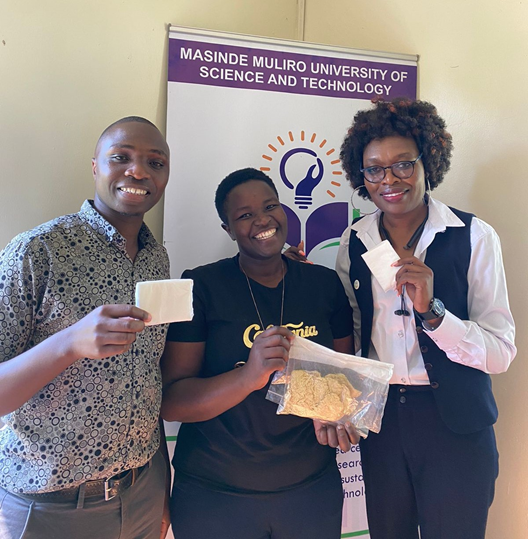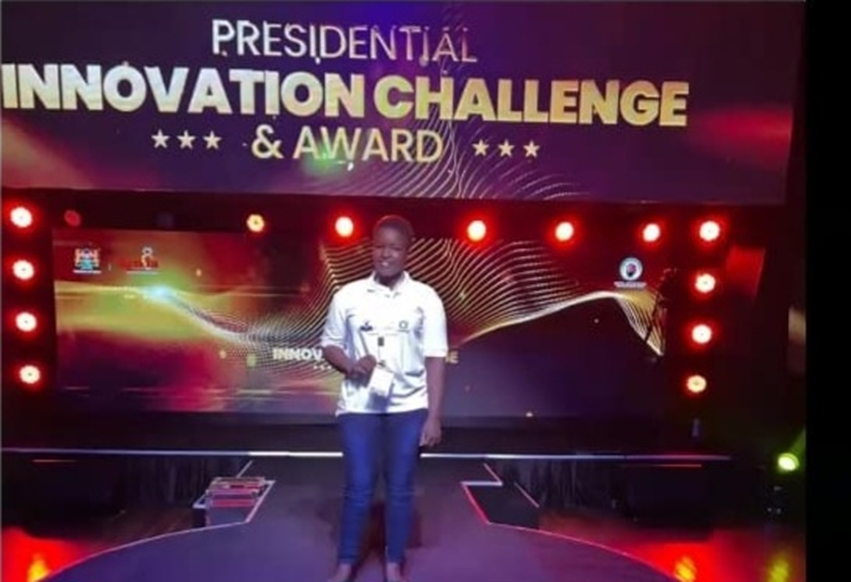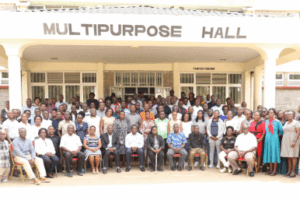
MMUST Student Innovator Teresia Nyandoro to Represent University at Global SDG Olympiad in Geneva
Masinde Muliro University of Science and Technology’s (MMUST) student innovators have developed a sustainable solution to two pressing problems: environmental pollution from plastic waste and the lack of access to affordable menstrual hygiene products. Led by the Founder, Ms. Teresia Nyandoro and her team members Ms. Janet Kamun Kwekwe and Mr. Fred Koyaya, their innovative project ‘Eco²- She – Eco-Friendly Economical Biodegradable Sanitary Pads from Sugarcane Bagasse’, emerged victorious in a highly competitive regional final pitching challenge. The team’s win came on 11th July, 2025, after their innovation was selected from eight unique proposals presented by the Directorate of Science Park Innovation and Incubation Centre (SPIIC). This victory has earned Ms. Nyandoro the opportunity to represent MMUST at the 2025 Global Sustainable Development Goals (SDG) Olympiad in Geneva, which will take place from 10th to 13th October, 2025.The Project, Eco²- SHE, is an innovative and sustainable sanitary product made from agricultural waste including sugarcane and sorghum bagasse. It is designed to address environmental and menstrual hygiene challenges as it offers an affordable, non-toxic, and accessible solution for menstruating individuals in low-income settings. The innovation promotes circular waste usage, women’s health, and education, which in turn, contributes to SDGs 3 (Good Health and Wellbeing), 5(Gender Equality), 9 (Industry, Innovation, and Infrastructure), 12 (Responsible Consumption and Production), and 13 (Climate Action).

Ms. Nyandoro during the Presidential Innovation Challenge.
Speaking during an interview, Ms. Nyandoro noted that sanitary pads are vital for maintaining menstrual hygiene, yet their accessibility and sustainability remains a challenge in many communities. She revealed that conventional pads contain plastic-based materials, synthetic fibers, and chemicals like dioxins and phthalates, which contribute to long-term environmental pollution and pose health risks.
“These pads are not biodegradable, leading to landfill accumulation and the release of harmful micro plastics. Besides this, many girls in rural Kenya miss school during menstruation due to inability to afford and lack of safe menstrual products, which affects their education and self-esteem, reinforcing gender-based inequalities. It is as a result of this that my team and I developed the Eco²- SHE pad, to respond to these challenges by offering a safe, cost-effective, and environmentally sound alternative using locally sourced agricultural waste that go underutilized, despite their potential as raw materials for sustainable product development,” said Ms. Nyandoro. She also expressed her profound gratitude for the mentorship and support from her team’s mentor, Dr. Tecla Sum, the Director of SPIIC.
Research and the creation of new knowledge are core to any University’s purpose and prestige. At MMUST, this mandate is being fulfilled with remarkable success. Through the efforts of the Directorate of Science Park, Innovation, and Incubation Centre (SPIIC) and the Innovation Academy, the university is successfully pushing its innovation agenda on a global scale. We extend our heartfelt congratulations to our student innovators Teresia Nyandoro, Janet Kamun Kwekwe, and Fred Koyaya for their outstanding achievement. Their journey from a campus innovation challenge to the global stage in Geneva is a true source of inspiration for the entire MMUST community.
By Caren Nekesa



